External links
- The Indefatigable Frog title listing at the Internet Speculative Fiction Database
| | This article about a science fiction short story (or stories) published in the 1950s is a stub. You can help Wikipedia by expanding it. |
"The Indefatigable Frog" is a science fiction short story by American writer Philip K. Dick, first published in the July 1953 edition of Fantastic Story Magazine , and later in The Collected Stories of Philip K. Dick . It has since been republished several times, including in Beyond Lies the Wub in 1988.
The story centers around two college professors, Hardy and Grote, who argue about one of Zeno's Paradoxes, called The dichotomy paradox, where a frog wants to get up from a well, but each jump is half of the previous one. That way, Hardy argues, the frog will never exit the well, while Grote argues the opposite: that the frog will eventually escape from the well.
The Dean of the college wants to settle this age-old paradox and instructs the two professors to create an experiment with the frog. Hardy and Grote do exactly that: they send the frog down a large tube and subject it to an energy field which reduces the size of the frog in half for each leap. The frog eventually becomes so small that it disappears. Grote goes into the tube to figure out what happened, while Hardy flicks on the switch, forcing Grote down the tube. Grote is halved in size as he progresses, and the smooth floor of the tube eventually becomes huge rocks and boulders as he nears microscopic size. Grote disappears, and Hardy claims that the frog never made it across and that he was right. In the end, Grote -- and the frog -- became so small that they passed through the molecules of the tube, away from the field and back to their original size.

Philip Kindred Dick, often referred to by his initials PKD, was an American science fiction writer. He wrote 44 novels and about 121 short stories, most of which appeared in science fiction magazines during his lifetime. His fiction explored varied philosophical and social questions such as the nature of reality, perception, human nature, and identity, and commonly featured characters struggling against elements such as alternate realities, illusory environments, monopolistic corporations, drug abuse, authoritarian governments, and altered states of consciousness. He is considered one of the most important figures in 20th century science fiction.

A Scanner Darkly is a science fiction novel by American writer Philip K. Dick, published in 1977. The semi-autobiographical story is set in a dystopian Orange County, California, in the then-future of June 1994, and includes an extensive portrayal of drug culture and drug use. The novel is one of Dick's best-known works and served as the basis for a 2006 film of the same name, directed by Richard Linklater.
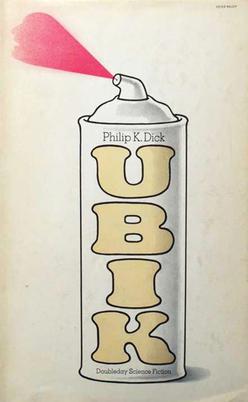
Ubik is a 1969 science fiction novel by American writer Philip K. Dick. The story is set in a future 1992 where psychic powers are utilized in corporate espionage, while cryonic technology allows recently deceased people to be maintained in a lengthy state of hibernation. It follows Joe Chip, a technician at a psychic agency who begins to experience strange alterations in reality that can be temporarily reversed by a mysterious store-bought substance called Ubik. This work expands upon characters and concepts previously introduced in the vignette "What the Dead Men Say".

The Man in the High Castle (1962) is an alternative history novel by Philip K. Dick wherein the Axis Powers won World War II. The story occurs in 1962, fifteen years after the end of the war in 1947, and depicts the life of several characters living under Imperial Japan or Nazi Germany as they rule the partitioned United States. The titular character is the mysterious author of a novel-within-the-novel entitled The Grasshopper Lies Heavy, a subversive alternative history of the war in which the Allied Powers are victorious.
"Faith of Our Fathers" is a science fiction short story by American writer Philip K. Dick, first published in the anthology Dangerous Visions (1967).
Richard Arthur Wollheim was a British philosopher noted for original work on mind and emotions, especially as related to the visual arts, specifically, painting. Wollheim served as the president of the British Society of Aesthetics from 1992 onwards until his death in 2003.
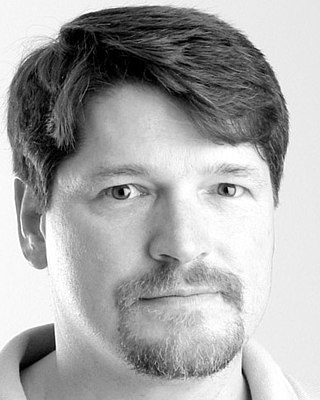
Bruce Bethke is an American author best known for his 1983 short story "Cyberpunk" which led to the widespread use of the term for the cyberpunk subgenre of science fiction. His novel, Headcrash, won the Philip K. Dick Award in 1995 for SF original paperback published in the US.
"The Last of the Masters" is a science fiction novelette by American writer Philip K. Dick. The original manuscript of the story was received by the Scott Meredith Literary Agency on July 15, 1953, and the story was published by the Hanro Corporation in the final issue of Orbit Science Fiction in 1954. It has since been reprinted in several Philip K. Dick story collections, beginning with The Golden Man in 1980.
"The War with the Fnools" is a science fiction short story by American writer Philip K. Dick. It was first published in Galaxy magazine in 1969.
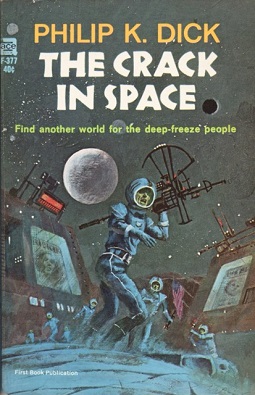
The Crack in Space is a 1966 science fiction novel by American writer Philip K. Dick. In the United Kingdom, it has been published under the title of the original novella, Cantata 140, published in the July 1964 issue of The Magazine of Fantasy & Science Fiction. This original title refers to the short title in English, Sleepers Awake, of J.S. Bach's Cantata BWV 140 and the novel's 'bibs', the millions sleeping in suspended animation. Both are based on the short story Prominent Author. The common elements are the Jiffi-scuttler transport device, the company, Terran Development, that manufactures it, and a brief summary of Prominent Author as an event of the past in chapter 2. The "crack in space" is a defect in Jiffi-scuttler operation that allows access to the earth and to parallel earths at various times and locations, beyond its intended use of providing near-instant transport between specific locations on the earth in the present.

Moira Crone is an American fiction author. She was born and raised in Goldsboro, in the tobacco country in eastern North Carolina. She is the author of three collections of short fiction and two novels. Her short stories have been classified as "Southern Gnostic", and as exemplifying the spirit of the New South. Her work has been compared to Flannery O'Connor's for its spiritual overtones and to Sherwood Anderson's for its depiction of small-town life and characters. She taught fiction writing at Louisiana State University, where she served for a number of years as Director of the MFA Program in Creative Writing and is now Professor Emerita. She also worked as fiction editor for the University Press of Mississippi. Her works have been chosen for the "Year's Best" by the award anthology New Stories From The South five times. In 2009, she was awarded the Robert Penn Warren Award in Fiction from the Fellowship of Southern Writers in recognition of her body of work. In the citation, Allan Gurganus wrote, "Moira Crone is a fable maker with a musical ear, a plenitude of nerve, and epic heart." Moira Crone lives in New Orleans. She is married to poet and author Rodger Kamenetz and has two daughters, author Anya Kamenetz and Kezia Kamenetz.

A Handful of Darkness is a collection of science fiction and fantasy stories by American writer Philip K. Dick. It was first published by Rich & Cowan in 1955 and was Dick's first hardcover book.

The Collected Stories of Philip K. Dick is a collection of 118 science fiction stories by American writer Philip K. Dick. It was first published by Underwood-Miller in 1987 as a five volume set. See Philip K. Dick bibliography for information about the mass market reprints.
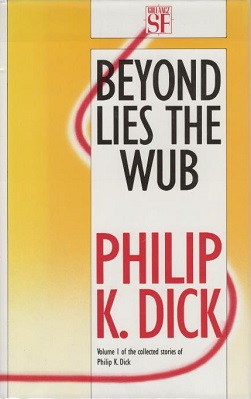
Beyond Lies the Wub is a collection of science fiction stories by American writer Philip K. Dick. It was first published by Gollancz in 1988 and later comprised Volume I of The Collected Stories of Philip K. Dick. Many of the stories had originally appeared in the magazines Fantasy and Science Fiction, Planet Stories, If, Galaxy Science Fiction, Imagination, Space Science Fiction, Fantastic Story Magazine, Amazing Stories, Future, Cosmos, Fantasy Fiction, Beyond Fantasy Fiction, Thrilling Wonder Stories, Startling Stories. The collection was reprinted by Citadel Press in 2003 under the title Paycheck and Other Classic Stories.

The Short Happy Life of the Brown Oxford is a collection of science fiction stories by American writer Philip K. Dick. It was first published by Citadel Twilight in 1990 and reprints Volume I of The Collected Stories of Philip K. Dick. Many of the stories had originally appeared in the magazines Fantasy and Science Fiction, Planet Stories, If, Galaxy Science Fiction, Imagination, Space Science Fiction, Fantastic Story Magazine, Amazing Stories, Future, Cosmos, Fantasy Fiction, Beyond Fantasy Fiction, Thrilling Wonder Stories and Startling Stories. The collection was reprinted by Citadel Press in 2003 under the title Paycheck and Other Classic Stories.
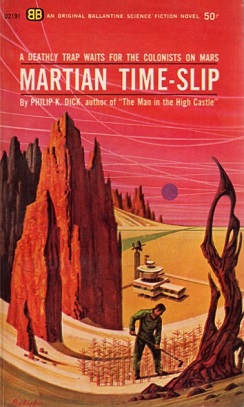
Martian Time-Slip is a 1964 science fiction novel by American writer Philip K. Dick. The novel uses the common science fiction concept of a human colony on Mars. However, it also includes the themes of mental illness, the physics of time and the dangers of centralized authority.
"The Short Happy Life of the Brown Oxford" is a science fiction short story by American writer Philip K. Dick, first published in the January, 1954 edition of The Magazine of Fantasy & Science Fiction and later in Beyond Lies the Wub in 1984 and in The Short Happy Life of the Brown Oxford, a collection of Philip K. Dick short stories, in 1990.

Satellite Science Fiction was an American science-fiction magazine published from October 1956 to April 1959 by Leo Margulies' Renown Publications. Initially, Satellite was digest-sized and ran a full-length novel in each issue with a handful of short stories accompanying it. The policy was intended to help it compete against paperbacks, which were taking a growing share of the market. Sam Merwin edited the first two issues; Margulies took over when Merwin left, and then hired Frank Belknap Long for the February 1959 issue. That issue saw the format change to letter size, in the hope that the magazine would be more prominent on newsstands. The experiment was a failure and Margulies closed the magazine when the sales figures came in.
Stability is a short science fiction story by Philip K. Dick, first written around 1947, but not published until 1987 in Volume I of The Collected Stories of Philip K. Dick. The story is set in the far future, where civilization never progresses; the government has determined it to have reached its peak, and to prevent declination, society is forcibly kept in a state of "Stability".